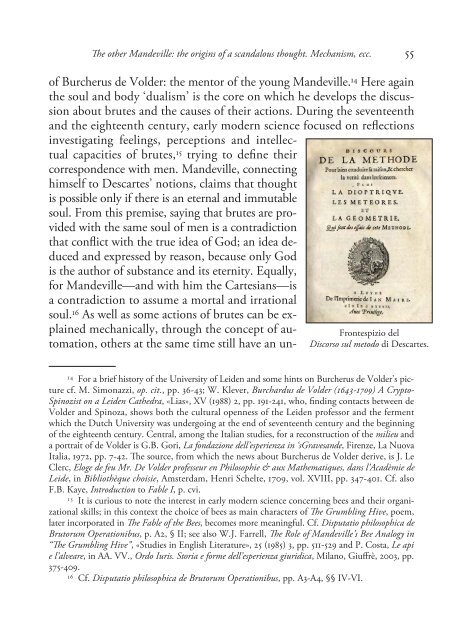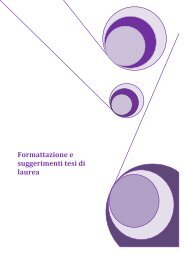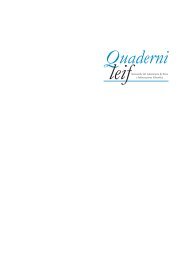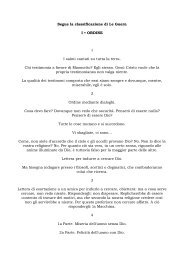qui - maria vita romeo
qui - maria vita romeo
qui - maria vita romeo
You also want an ePaper? Increase the reach of your titles
YUMPU automatically turns print PDFs into web optimized ePapers that Google loves.
e other Mandeville: the origins of a scandalous thought. Mechanism, ecc. 55<br />
of Burcherus de Volder: the mentor of the young Mandeville. 14 Here again<br />
the soul and body ‘dualism’ is the core on which he develops the discussion<br />
about brutes and the causes of their actions. During the seventeenth<br />
and the eighteenth century, early modern science focused on reflections<br />
investigating feelings, perceptions and intellectual<br />
capacities of brutes, 15 trying to define their<br />
correspondence with men. Mandeville, connecting<br />
himself to Descartes’ notions, claims that thought<br />
is possible only if there is an eternal and immutable<br />
soul. From this premise, saying that brutes are provided<br />
with the same soul of men is a contradiction<br />
that conflict with the true idea of God; an idea deduced<br />
and expressed by reason, because only God<br />
is the author of substance and its eternity. Equally,<br />
for Mandeville—and with him the Cartesians—is<br />
a contradiction to assume a mortal and irrational<br />
soul. 16 As well as some actions of brutes can be ex-<br />
plained mechanically, through the concept of automation,<br />
others at the same time still have an un-<br />
Frontespizio del<br />
Discorso sul metodo di Descartes.<br />
14 For a brief history of the University of Leiden and some hints on Burcherus de Volder’s picture<br />
cf. M. Simonazzi, op. cit., pp. 36-43; W. Klever, Burchardus de Volder (1643-1709) A Crypto-<br />
Spinozist on a Leiden Cathedra, «Lias», XV (1988) 2, pp. 191-241, who, finding contacts between de<br />
Volder and Spinoza, shows both the cultural openness of the Leiden professor and the ferment<br />
which the Dutch University was undergoing at the end of seventeenth century and the beginning<br />
of the eighteenth century. Central, among the Italian studies, for a reconstruction of the milieu and<br />
a portrait of de Volder is G.B. Gori, La fondazione dell’esperienza in ‘sGravesande, Firenze, La Nuova<br />
Italia, 1972, pp. 7-42. e source, from which the news about Burcherus de Volder derive, is J. Le<br />
Clerc, Eloge de feu Mr. De Volder professeur en Philosophie & aux Mathematiques, dans l’Acadèmie de<br />
Leide, in Bibliothèque choisie, Amsterdam, Henri Schelte, 1709, vol. XVIII, pp. 347-401. Cf. also<br />
F.B. Kaye, Introduction to Fable I, p. cvi.<br />
15 It is curious to note the interest in early modern science concerning bees and their organizational<br />
skills; in this context the choice of bees as main characters of e Grumbling Hive, poem,<br />
later incorporated in e Fable of the Bees, becomes more meaningful. Cf. Disputatio philosophica de<br />
Brutorum Operationibus, p. A2, § II; see also W.J. Farrell, e Role of Mandeville’s Bee Analogy in<br />
“e Grumbling Hive”, «Studies in English Literature», 25 (1985) 3, pp. 511-529 and P. Costa, Le api<br />
e l’alveare, in AA. VV., Ordo Iuris. Storia e forme dell’esperienza giuridica, Milano, Giuffrè, 2003, pp.<br />
375-409.<br />
16 Cf. Disputatio philosophica de Brutorum Operationibus, pp. A3-A4, §§ IV-VI.








